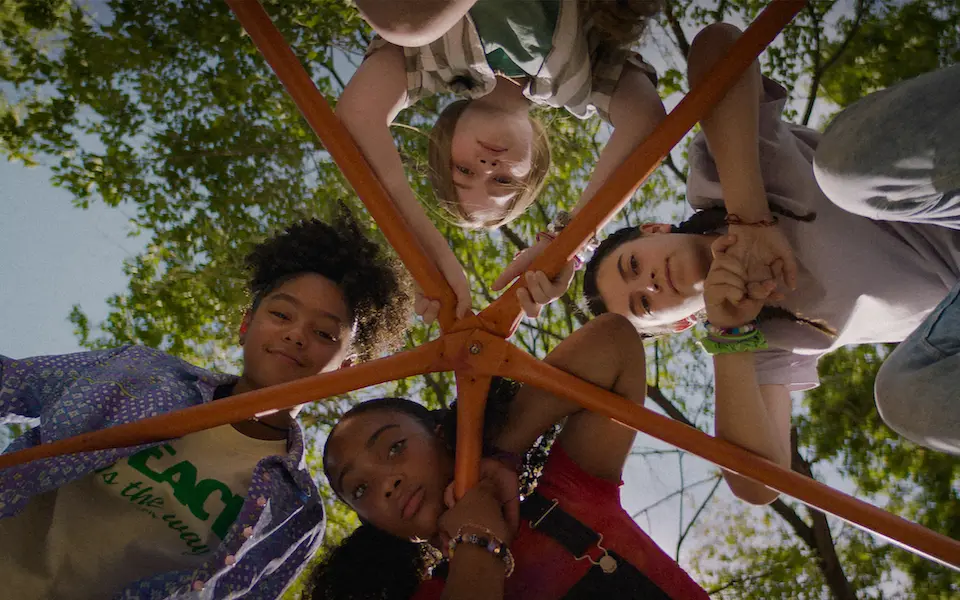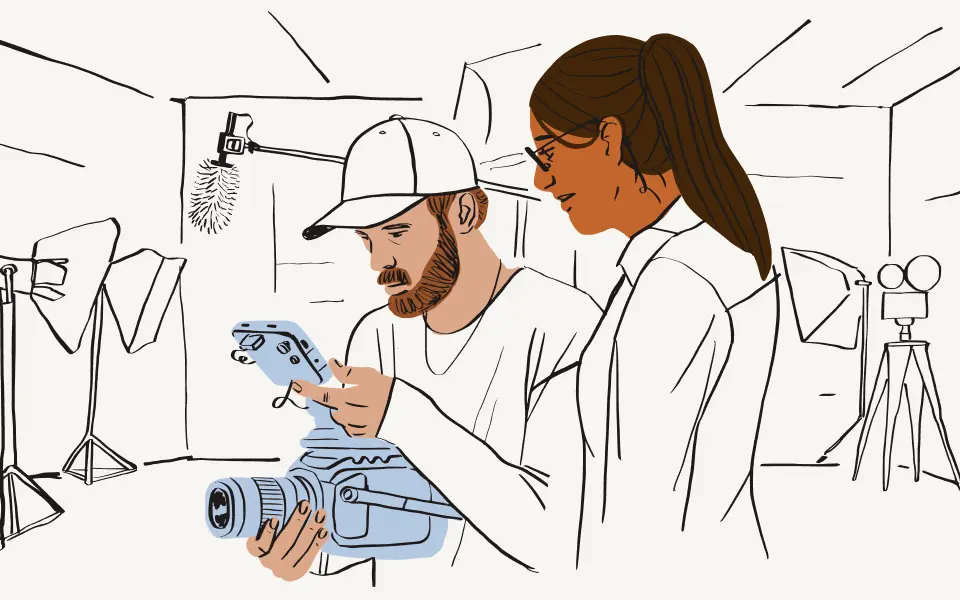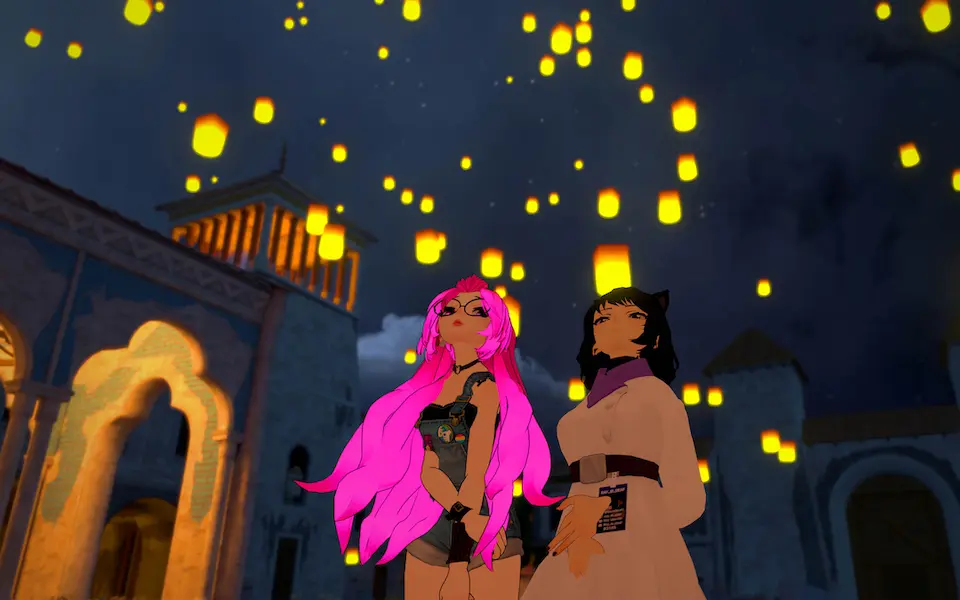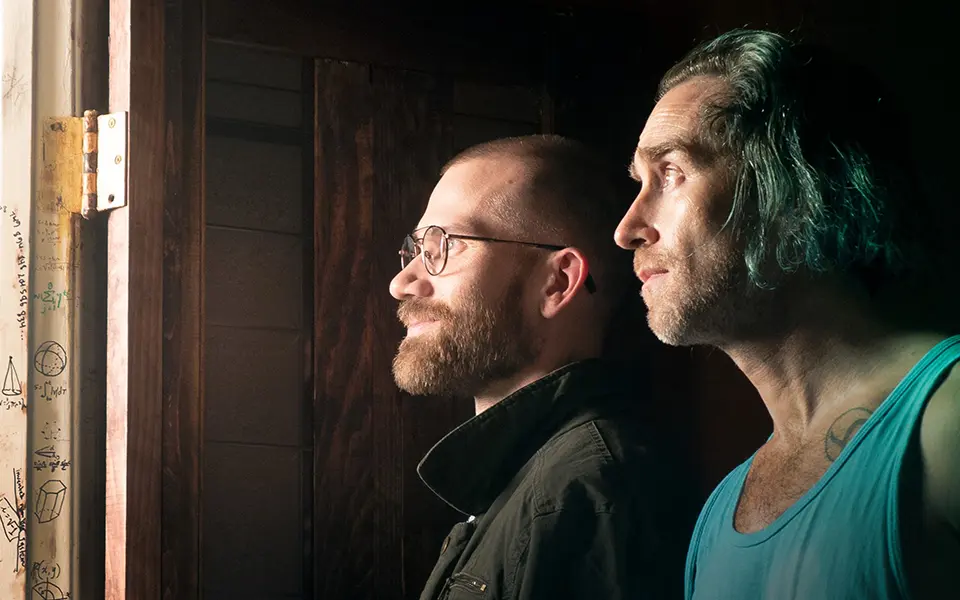
Dropbox for filmmakers, Sundance Film Festival 2022
How the young cast of Summering helped keep the movie honest
Published on January 25, 2022
Though he’s best known for adaptations such as Spectacular Now, The End of the Tour, and The Circle, writer/director James Ponsoldt wanted to tap into a topic closer to home for his new film.
Summering—a Bleecker Street film that premiered at the 2022 Sundance Film Festival and used Dropbox throughout the production—stars Lia Barnett, Madalen Mills, Eden Grace Redfield, and Sanai Victoria as four friends on the last weekend of summer before they start sixth grade. The film also features Megan Mullally, Lake Bell, Ashley Madekwe, and Sarah Cooper as their mothers.
Though it contains echoes of the 1986 classic Stand By Me, the true inspiration for the story came from Ponsoldt’s own family. “So much of the way that I view the world [came] from my mother and my older sister, as a beneficiary of their good tastes,” he says. “I enjoyed the privilege of seeing myself on screen a million times. It wasn't until I got older that I realized that they couldn't always see themselves in characters on screen.”
Then one evening, Ponsoldt and his daughter were watching Miyazaki’s Kiki's Delivery Service together. They started talking about big picture issues in their lives, and how hard it was to find narratives that reflected what his daughter was feeling. And they weren’t the only ones to notice those missing stories.
“I had conversations with a good friend named Ben Percy, who's a fantastic novelist, short story writer, comic book writer,” he recalls. “He had an experience where he was reading The Hobbit to his daughter. They were maybe 100 pages in, and she said, ‘Dad, they've only used the word ‘she,’ three times.’ I think he felt a level of shame. That was sort of the root of where it started.”
Though the script was written before the pandemic, Ponsoldt says the perspective of the film crystallized and sharpened as COVID took off in early 2020. Anxious questions that came up at home soon became an undercurrent in the making of Summering.
“I have three young kids and being a parent impacts the choices I make and how I spend my time,” says Ponsoldt. “When we entered the dystopian science-fiction film that is modern life for the past two years, conversations I was having with my kids—Are you safe when you go to work? Will you come back?—began being refracted or reflected in the conversations in the film.”
“It's suddenly a story about four young friends trying to make sense of death, and their obligations to a stranger. What is our duty as children, as friends to our neighbors, to the people we don't know, as far as a sense of justice, kindness, decency, and fear of change? We live in times where the abstract fears of childhood felt more palpable and real.”
“Conversations I was having with my kids began being refracted or reflected in the conversations in the film.”
Ponsoldt says the age of the characters was especially important to the development of the story because of their reaction to plot twists in the movie.
“They're 12 years old, which is that final cusp of what you could call childhood, before adolescence really begins—when it's like adult cosplay, and you can't wait to be older,” he says. “For a lot of kids that age, their fear of losing their friends might be more palpable than their fear of death, because maybe they haven’t yet experienced the death of someone close to them.”
Ponsoldt became inspired to explore that vital moment when kids still use their imagination to process trauma. We spoke with him about how personal experiences with his own family influenced the development of Summering.
~ ~ ~
You've had such great success adapting works written by others. How does that compare to making a film from your own script?
This was such a personal story. It always becomes personal quickly when I'm adapting someone else's writing. I have such reverence for writers. I'm a fierce defender of the word and other people's words. But I'm much less precious when it's my own writing. As the saying goes: ‘You don't want the truth to get in the way of a good story.’ You’re just trying to get to some essential truth.
In the case of Summering, as it evolved, there are aspects of the film that developed through the revision process. There are tropes related to horror and fantasy that live in the imaginations of the characters. That came about in later drafts that felt very natural to the psychology of the characters at the age they were at.
For a lot of people, being 11, 12, or 13 years old [feels like] the genre of your life is constantly shifting. You're in a comedy, then a drama, then a total body dysmorphic horror film. It made sense to sort of blur genres a little bit in this film. Then, as we were developing [the film], the whole world changed genres, you know what I mean? It felt like we're living in Groundhog Day, then 28 Days Later!
Did you feel more freedom to make changes on the fly during the production since you were working from your own script?
I have a lot of strong, awesome women in my life who always read all of the scripts I'm gonna write. I was asking them to read drafts of the script and scrutinize it for authenticity, for honesty.
My wife works at a middle school and high school. I wanted [to ask] the kids there ‘What's your take on these characters? How would you say it? What would you do? Does this feel honest? What is your life like?’ I tried to be open and humble through the process… to whatever they're gonna say, even if it cuts close.
When we got into production, what I most valued was the perspective of the the young actors who are the leads. They became the characters. Now there were real flesh-and-blood people who have real lived-in experiences. To some degree, I always defer to the actors and ask them, ‘How would you say this? Is this what you would do?’ But in this case, I was profoundly open to it because I wasn't protecting someone else's dialogue. In this case, I'm talking to someone who’s an amazing, brilliant, specific, inspiring 13-year-old-person and they’re telling me they would say this and not that and I'm gonna listen to them.
Film, by its nature, is a collaborative medium. I'm pretty good with a camera. I'm pretty good as an editor. I'm an okay musician. But I'm privileged and lucky enough to work with excellent cinematographers, composers, and actors. Part of what comes with that is valuing their artistry, and realizing that [with] the hive mind, the groupthink of it all, you can make something better than you could ever make by yourself. I love the collaboration of it.
What was the biggest unexpected obstacle you had to overcome during the production? Is there an MVP crew member who went above and beyond to help you solve that problem?
It was a crew of MVPs, and I mean that genuinely. With smaller films, it takes a crew of MVPs to pull the thing off. We made a low-budget film during COVID, with COVID protocols in place. Positive cases would have shut us down and evaporated the whole project.
We were shooting in Utah, which is a magnificent place to film. But a lot of the western United States this past summer was on fire. Our first week of shooting was all exteriors with children while it was 106 degrees, and there was smoke in the air. So it involved having a well-made plan and just shifting. Because we had minors, there were shorter days. You had to be ruthlessly efficient with the limited time. When we were planning our call time, we had to take into account the heat and air quality of the day.
A lot of it was exteriors, which during these times is probably better than being cramped and inside, but when you have heat or bad air quality, that can work against you. So we were always trying to figure out how to balance telling our story honestly while being humane and decent and putting the health and emotional well-being of the cast and crew first and foremost. Movies are life to me, but there's also life as in the lives that our cast and crew are living and that was our number one priority.
“When we got into production, what I most valued was the perspective of the the young actors who are the leads.”
Which tech tools did you rely on for remote collaboration?
I wrote the script with my friend Ben Percy. He lives in a small town in Minnesota. I live in Los Angeles. So everything is remote. We are constantly sharing Final Draft files back and forth. I'm using Dropbox all the time. I'm using Frame.io when I'm actually working remotely with people. We're on Zoom, Google Docs. They just have a constant flow.
In some cases, I think obstructions and limitations can be pretty liberating, actually. It's what the world has given us, so you can either pull the covers over your head and give up or just adapt. Which is what's so awesome about Sundance this year—everyone that is there with a film found a way to adapt.
The entire festival adapted, right? It's super inspiring. Yeah, it's a bummer that it's not in person, but that it can adapt, that it can democratize, that it can take the festival out to people in every corner of the country. I'm not someone from Park City, or LA or New York. I'm from a small town in Georgia. The idea that my parents from Georgia can participate in Sundance at the same time that I can, it's awesome. I love that.
How did you use Dropbox in the making of Summering?
I use Dropbox 50 times a day. Every document that I'm writing, I’m backing up. I've had hard drive crashes on computers. It is a psychically devastating thing to have your computer go down, and not have it backed up, which happened to me in earlier, more naive versions of myself. So Dropbox has been a boon. I feel a level of confidence and safety in backing up my documents, then sharing images with a production designer, cinematographer, or costume designer. Using Dropbox to do that is something that we constantly do, and certainly did on this production. I’m finding grabs on the internet, or ripping frames from films and posting them so they can see them. It's something we do all the time.
What piece of advice would you give to other creators who are kind of struggling to stay inspired during this time of isolation?
I would say, ‘Don't beat yourself up.’ There's those cliches of people who have an Instagram persona. It feels like they're living their best lives somehow. That, to me, feels like an impossible reach. It doesn't dignify exactly what you're feeling. If what you're feeling is that you're stuck or depressed or lonely or anxious—those are all natural parts of being alive. Don't push those down and pretend they don't exist. Acknowledge that part of your humanity.
That same well that you dip into that is inspiration, that is hope, that is love, that is creativity is also anxiety, fear, loneliness. It's all connected. So dignify what you're feeling and realize that creation of any kind begets creation. Writing something every day catalyzes something in you. Just create something. Just get out and do something. For me, just getting a 30-minute walk in can be a great creative act.
Don't judge and don't expect anything to be perfect. I can have OCD tendencies where I can get stuck when I'm writing. I'll just rewrite the same thing and get stuck in a thought loop which can become a negative thought loop.
That term ‘vomit draft’ might mean different things to different people, but… just vomit out a first draft and recognize that no one's gonna read it except to you. That sense of judgment and insecurity, that this is just garbage—that doesn't matter. You are alone and you have an idea in your head. Once you vomit out something, even if it is this distorted, grotesque, mishmash of ideas, it is now something you can shape and relate to. So just create and don't be so damn hard on yourself. These are hard times!
“Writing something every day catalyzes something in you. Just create something. Don't judge and don't expect anything to be perfect.”
What feeling would you like the audience to take away after seeing Summering?
I recognize that a lot of the conversations that I've been having with my kids over the past couple of years now are reflected in this film. It was not intentional, but I can see it now. Now that the movie is almost in the rearview mirror—we're about to let go of it and give it to the world—I can see a lot of the questions [my kids] have been asking me, “Are you going to be okay? Am I going to be okay? Do you love me? Should I be afraid? Will things go back to the way they were?”
All of those things we've been feeling are, in some literal or abstract way, in this film. They were experienced by the characters. They were thoughts that were had by the people that made it. They were conversations that were had by the many people who collaborated on it. At the core, this is a portrait of friendship and love between friends, love between parents and children. And while the film dignifies anxiety, fear, and loneliness, ultimately, it is hopeful. That’s what I hope people come away with—a sense of hope.
This interview has been lightly edited and condensed for clarity.
To learn more about Summering and the 2022 Sundance Film Festival, visit festival.sundance.org



